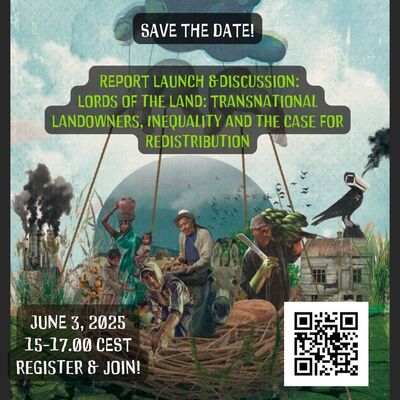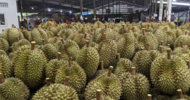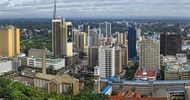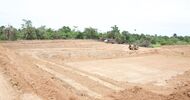Earthsight report exposes the secrecy and collusion in industrial agriculture which are threatening the Congo Basin’s forests. This post details findings from The Republic of Congo.
In the largest agriculture-tech funding round in history, vertical farming startup Plenty attracted $200 million. Plenty will use the investment to build more farms around the world.
- Business Insider
-
03 August 2017
Sierra Leone calls for urgent land audit. In the last five years, 30% of the arable land has gone to large-scale investors.
A new online tool created by the Midwest Center for Investigative Reporting allows individuals to check up on just how much American land is currently owned by foreign entities, and the results might be surprising. Between 2004 and 2014, these databases show foreign investors doubled their American farmland holdings.
“In these supposedly win-win contracts, I would like to know what our communities are gaining. On the contrary, we are losing and even dying a slow death.”
Large-scale land thieves are seizing, deforesting then selling public lands. At the same time, Brasilia is defunding enforcement, with rainforests and landless peasants the losers.
Thematic portfolio aims to be "the go to source of information on land and investments."
Duncan Pruett reflects on the last 5 years at work advocating on the issues of land rights and foreign investments in agriculture.
- Landportal.info
-
24 June 2016
Global investors have spent more than $90 billion buying agricultural lands the size of Finland in deals criticized by rights groups for displacing small farmers, according to research published on Tuesday.
Large-scale agricultural production will benefit private-sector firms rather than poor people, Grain says, noting that financial companies and sovereign wealth funds are responsible for about a third of the deals.
- Guardian
-
19 February 2015
Since 2007, a plantation company had been scheming to take over more than three-quarters of the Indigenous islanders’ ancestral land in the Aru islands of Indonesia.
- Interconintental Cry
-
21 April 2014
Oil palm cultivation has wrecked habitats in South-East Asia. We must avoid a rerun if the crop takes off in its native Africa
- New Scientist
-
20 January 2014
The UK is the fourth largest investor in the world in African land - but how much does it have and what is it using it for?
- Guardian
-
27 November 2013
International environmental and human rights campaigners condemn the 4th Latin American Palm Oil Conference to be held by the Round Table on Sustainable Palm Oil in Honduras on 6th-8th August
- Rights Action et al.
-
06 August 2013
The most recent U.N. demographic projections show world population growing to 9.3 billion by 2050, an addition of 2.3 billion people. Most people think these demographic projections, like most of those made over the last half-century, will in fact materialize. But this is unlikely, given the difficulties in expanding the food supply, such as those posed by spreading water shortages and global warming. We are fast outgrowing the earth’s capacity to sustain our increasing numbers.
Since 2011, World Bank investments in large palm oil companies have virtually stopped, but it has backed off from applying the same approach to other crops, although the risks to local communities and indigenous peoples from land grabs from other agribusinesses are not much different.
Under the initiative of the Indian Ocean Commission, Madagascar is the focus of a large project to produce and export agricultural products to ensure the food security of this regional space, raising the spectre of land grabbing.
The Liberian government has leased nearly 6 per cent of Liberia’s total land mass to palm-oil companies. More than a million people live on those lands, and 150,000 will be affected in the first five years of the plantations.
- Globe and Mail
-
27 September 2012
The Asian Peasant Coalition, the Kilusang Magbubukid ng Pilipinas and the Danggayan dagiti Mannalon ti Isabela say that because of farmers’ militant actions a bio-ethanol plant was victoriously shut down in San Mariano, Isabela, northeastern Philippines
In the last five years, land concessions totaling tens of thousands of hectares have been granted to private companies for industrial sugarcane production in Cambodia.
- Terra Nullius
-
23 July 2012
Some CSOs are using the media to paint an inaccurate and distorted picture of the World Bank Group’s work and they are questioning the motives of the conference, says the World Bank's Klaus Deininger.
Unfortunately, given the global nature of capital, even if the US were to completely shut down speculation, it would just move offshore.
- AlterNet
-
23 September 2011
Foreign investors see Africa as a breadbasket. Done well, investment could help with African hunger but create food security for the rest of the world.
- CSMonitor
-
06 February 2011
Saskatchewan has some of the richest and least expensive farmland in the world, and there's a gigantic pool of global money that would like to buy up as much of it as they can.
- Globe and Mail
-
24 November 2010
News of progress on the massive Merauke food estate in Papua indicates growing momentum behind Indonesia’s attempts to boost its agricultural output through promoting investment and harnessing technology.
- Jakarta Post
-
04 October 2010
Runaway farmland and borderland giveaway deals need to be publicly scrutinized to ensure transparency (detect corruption and criminality) and to make certain that private interests (sweetheart deals) have not overtaken the public interest, or secret deals are not made to harm the Ethiopian national interest.
- Huffington Post
-
15 February 2010
While many peasant organizations are relentlessly drawing attention to this devastating land-grabbing, the UN and other agencies have been characteristically slow to act.
- Toward Freedom
-
09 February 2010
The main objective of this essay is to draw the attention of fellow Ethiopians to the issue. So that it stays front and center in our contemporary political agenda, until we manage to mobilize the necessary popular pressure and try our best to stop it from taking effect.
- Anyuak Media
-
31 January 2010
The fervour with which foreign commercial interests are forcing their agricultural 'solutions' on the African continent represents nothing more than an established endeavour to protect profits and access to resources.
- Pambazuka
-
05 November 2009
In many parts of the developing world, legislation allowing compulsory acquisition of land in the public interest has been used to make land available not for schools or hospitals, but for commercial projects – in the mining, petroleum or agriculture sectors.
















